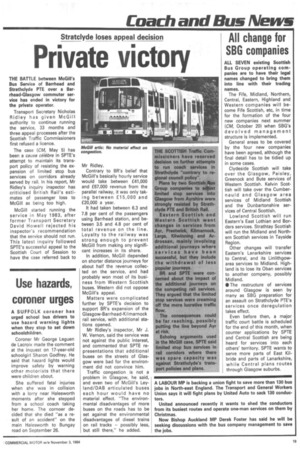Private victory
Page 21

If you've noticed an error in this article please click here to report it so we can fix it.
THE BATTLE between McGill's Bus Service of Barrhead and Strathclyde PTE over a Barrhead-Glasgow commuter service has ended in victory for the private operator.
Transport Secretary Nicholas Ridley has given McGill authority to continue running the service, 33 months and three appeal processes after the Scottish Traffic Commissioners first refused a licence.
The case (CM, May 5) has been a cause célèbre in SPTE's attempt to maintain its transport policy of resisting the expansion of limited stop bus services on corridors already served by rail. In his report, Mr Ridley's inquiry inspector has criticised British Rail's estimates of passenger loss to McGill as being too high.
McGill started running the service in May 1983, after former Transport Secretary David Howell rejected his inspector's recommendation that the service should not run. This latest inquiry followed SPTE's successful appeal to the Scottish Court of Session to have the case referred back to Mr Ridley.
Contrary to BR's belief that McGill's basically hourly service would take between £41,000 and £67,000 revenue from the parallel railway, it was only taking between £15,000 and £20,000 a year.
It had taken between 6.3 and 7.8 per cent of the passengers using Barrhead station, and between 3.5 and 4.8 per cent of total revenue on the line. Loyalty to the railway was strong enough to prevent McGill from making any significant increases in its share.
In addition, McGill depended on shorter distance journeys for about half the revenue collected on the service, and had probably won most of its business from Western Scottish buses. Western did not oppose McGill's appeal.
Matters were complicated further by SPTE's decision to support BR's expansion of the Glasgow-Barrhead-Kilmarnock rail service, with additional stations opened.
Mr Ridley's inspector, Mr J. W. Vernon, said the service was not against the public interest, and commented that SPTE representations that additional buses on the streets of Glasgow were bad for the environment did not convince him.
Traffic congestion is not a problem in Glasgow, he said, and even two of McGill's Leyland/DAB articulated buses each hour would have no material effect. "The environmental disadvantages of more buses on the roads has to be set against the environmental disadvantages of diesel trains on rail tracks — possibly less, but still there," he added.








































































































